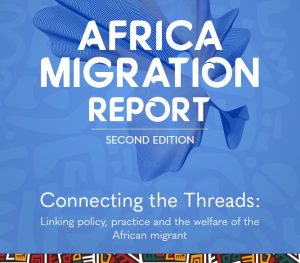Conflict and climate driving migration, displacement in Africa
 Conflict and violence remain the main drivers of displacement, made worse by climate shocks and hazards, according to a new report by the International Organisation for Migration (IOM) and the African Union Commission (AUC).
Conflict and violence remain the main drivers of displacement, made worse by climate shocks and hazards, according to a new report by the International Organisation for Migration (IOM) and the African Union Commission (AUC).
The second edition of the Africa Migration Report concludes that migration in Africa primarily occurs within the African continent, rather than beyond its borders.
The report identified links between migration drivers in Africa, including economic disparities, political instability, and the impacts of climate change.
“Prolonged drought in the Horn of Africa and severe seasonal flooding across the continent led to record internal displacements in 2022, adding to the fact that many African countries experienced conflict and climate events at the same time,” the report said.
IOM Director General Amy Pope said new strategies were needed to solve problems caused by rising migration.
“Conflict, violence and climate induced disasters are major drivers to displacement in Africa and around the world. We must adopt proactive strategic and innovative approaches to anticipate people’s movements by having early-warning systems in place and finding lasting solutions,” Ms Pope said.
Unlike in other parts of the world, new conflicts have increased displacement in sub-Saharan Africa where nine million people have been displaced in 2022 while climate shocks led to 7.4 million.
Since 2010, the number of migrant workers in Africa has increased by 53 per cent. Migrants from West, Central, Southern, and East Africa predominantly reside in neighbouring African nations, highlighting the significance of return migration within Africa, particularly in countries sharing land borders, the report says.
Although migration data sources in the continent are unsystematic, the report says considerable progress has been achieved in recent years to enhance the availability and quality of migration and human mobility data.
In the face of new complexities and crises, the report recommends the need to build on existing data including through strengthening coordination between stakeholders at the national, regional, and continental level to inform anticipatory actions and foresight.
The report also points out the need for governments to commit to safeguarding the welfare of migrants and to coordinate migration related policies across Africa.
The report highlights the intricate nature of human mobility in Africa, calling for a welfare-centric approach in the management of mobility.
A surprising finding of the report was that internal migration in Africa surpasses external migration.
IOM and the AUC have been collaborating on migration-related issues for over twenty years, working together to develop frameworks to help govern mobility on the continent and to assist member states to effectively manage migration.
Read the full report: Africa Migration Report (Second edition) | IOM Publications Platform












